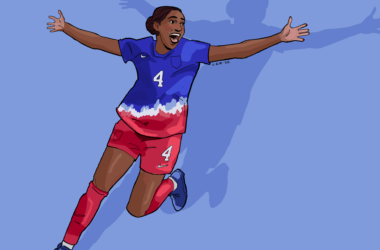On Jan. 13, 2024, the Africa Cup of Nations (AFCON) 2023 (yes, you read that correctly––it was postponed from July due to weather concerns in the host country) kicked off in Abidjan, Côte d’Ivoire. Africa’s marquee tournament is as whimsical as it is star-studded, with big names such as Egypt’s Mo Salah, Nigeria’s Victor Osimhen, Senegal’s Sadio Mané, and more competing. This year’s iteration is composed of 24 teams divided into six groups of four. The top two teams from each group and the four best third-place teams progress to the next stage, after which there is a knockout stage culminating in a final on Feb. 11.
Egypt, Sudan, and Ethiopia competed in the first Africa Cup of Nations, in 1957. During the wave of African independence, AFCON served as a way for national leaders to unify the populations of their new large, ethnically diverse nations. Indeed, the first president of Ghana, the pan-Africanist Kwame Nkrumah, enthusiastically supported the Ghanaian national team as he recognized the importance of creating an indigenous unifying national identity separate from the European colonial institutions he had inherited upon independence. Ghana won AFCON thrice, which––at that time––meant Ghana kept the trophy permanently, then known as the Abdel Aziz Abdallah Salem Trophy. After Cameroon won the trophy for the third time in 2000, then called the African Unity Cup, this particular quirk of AFCON was retired, and three-time victors get to keep a trophy replica rather than the actual trophy itself. As well, South Africa’s surprise 1996 AFCON win with an ethnically diverse team helped bring the nation together after the dissolution of apartheid, emphasizing the tournament’s political importance.
While six teams have a fairly even chance of coming away with AFCON’s ultimate prize this year, tournament host Côte d’Ivoire, World Cup semi-finalists Morocco, and defending AFCON champions Senegal are viewed as favourites. Egypt is the country with the most wins in the competition, having triumphed seven times with the most recent occurring in 2010. After captaining his side to finals in 2017 and 2021, Egyptian fans are hoping Mo Salah will be able to take Egypt all the way this time around.
While football clubs in Europe tend to have a negative perception of AFCON, as players selected for the tournament will miss up to a month of club action. However, for many players, being nationally selected and competing in AFCON is one of the highest honours they can hope to receive. While other FIFA-sanctioned international tournaments take place every four years, AFCON takes place every two years as the Confederation of African Football (CAF) seeks to promote the growth of the game across Africa.
AFCON is unlike any other tournament: The juxtaposition of overlapping identities and nationalities take centre stage. Many national teams such as Morocco, Algeria, Democratic Republic of the Congo, and the Comoros rely on their diasporas to strengthen their squads. Kalidou Koulibaly, who grew up in France to Senegalese parents, was pursued by France for many years, yet reaffirmed his connection to Senegal and desire to build the future of Senegalese soccer. AFCON allows footballers who do not always feel represented in their countries of birth to feel connected to their roots. Yet players who grew up in European academy systems are not necessarily at a competitive advantage over their continental peers. The atmosphere, the pitch conditions, the energy––playing in Africa is unlike anything they have experienced before.
Despite the tournament kicking off just a week ago, there have already been notable upsets, as the island nation of Cape Verde defeated Ghana 2-1, Namibia defeated Tunisia 1-0 and, shockingly, Equatorial Guinea defeated Côte d’Ivoire 4-0, effectively knocking them out at the group stage. As in any tournament, underdogs can go far, and there promises to be many more upsets, especially as more established nations such as Cameroon and Ghana struggle.
In a country as diverse and multilingual as Canada, AFCON is the perfect tournament to watch as it showcases the African continent’s incredible cultural and linguistic diversity. Montreal and McGill have significant African diasporas as well. With favourable kick off times for those of us in the Eastern Standard time zone (EST), don’t be surprised if you see more and more people tuning in to matches throughout your day. With equal potential to stun and enchant, AFCON 2023 is the perfect tournament for veteran soccer fans as well as those looking to get into the sport. We will certainly be watching.
You can live stream AFCON 2023 on FuboTV.









